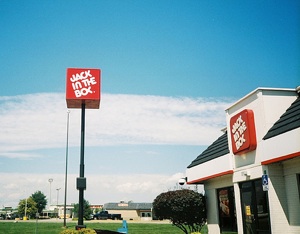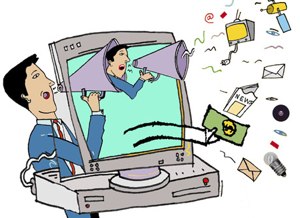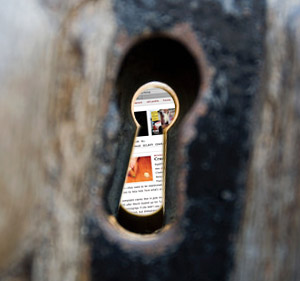Yesterday the FCC announced new, expanded rules enforcing net neutrality, and they’ve set aside the next 60 days for public debate. Get ready to hear all sorts of creative end-of-the-world-as-we-know-it arguments from opponents like AT&T. We’ve checked out the official document (pdf) and below we summarize the changes that are open to public discussion for the next two months.
web

Borders To Offer Free Wifi
Later this month, Borders and Verizon will roll out free Wifi access in “virtually all” Borders stores, with no password or access fee required. Borders’ CEO Ron Marshall says their goal is to extend “the open atmosphere of exploration that is at the core of every great bookstore experience,” and then he said something about building a community, yakkity yak. You know how press releases are. Whatever, Marshall, we’re just happy you’re offering free Wifi access!

Internet Speeds Are Lower Than Advertised 50-80% Of The Time
Anyone who reads the fine print when signing up for Internet access knows that the speeds advertised are “best case” scenarios, or more cynically that they’re total fabrications meant to lure in customers. Now the FCC, as part of its larger study of how to expand broadband access, has reported that “actual broadband speeds lag advertised speeds by as much as 50% to 80%.”

Faberge.com Sells $7 Mil Baubles To Special People Only
The reborn Faberge has decided that the rich don’t shop online like the rest of us.

Try To Get DSL From AT&T, They Dare You
The person who blogs at MichiganTelephone just tried to help his friend sign up for DSL from AT&T last week. Their experience was so full of fail that now his friend doesn’t even want to bother trying anymore. Yes, a customer came to AT&T ready to sign up, and AT&T drove him away. Michigan telephone wonders, “Does AT&T have a death wish, or are they really just that incompetent?”

RIAA To Stop Suing File Sharers
The Wall Street Journal and Ars Technica are reporting that the RIAA has announced a fairly dramatic change in its strategy to fight piracy.

../..//2008/09/09/google-has-announced-that-theyre/
Google has announced that they’re shortening the duration that they keep personal data on users from 18 months to 9 months. Yay! “It’s no big deal—we’ve already got more personal info on you than we know how to monetize,” said a Google official in a totally fabricated (yet plausible) statement. [Reuters]
../..//2008/09/02/cnet-has-rounded-up-a/
Cnet has rounded up a list of free bandwidth monitoring apps for Windows and Mac users who will be facing Comcast’s new 250 GB download limit next month. They aren’t perfect, but they “should tide you over until Verizon brings some Fios action to your hood.” [download.com]

Should The Government Set Up A "Do-Not-Track" List?
One of the most popular sentiments expressed by readers on our blog is “be a smart consumer.” Now two privacy advocacy organizations are calling for the creation of a “do-not-track” list that would protect registered users from online data collection. They argue that a list is needed because too many consumers won’t or can’t understand the methods behind online tracking. To illustrate, one of the organizations “pointed to a 2005 University of Pennsylvania survey in which only 25 percent of respondents knew that a Web site having a privacy policy doesn’t guarantee that the site refrains from sharing customers’ information with companies.” But a do-not-track list is overkill, and a fearful reaction against emerging technologies.

Select Jack In The Boxes Offering Free Wi-Fi
If you live in California or Arizona, your nearby recently-remodeled Jack in the Box restaurant might be offering free wi-fi, says Knowzy.com. “If you see a big screen TV, look for a 5 digit code in the bottom left corner. It’s your ticket to free Internet with your burger and fries.” So far the service isn’t being officially promoted and appears to be in a testing phase, but Knowzy’s editors were able to use the service at several Jack in the Boxes they visited.

Flash-Based Malware Ad Sneaks Onto Legit Websites Via DoubleClick
A new malware ad has managed to sneak its way onto Doubleclick’s DART ad publishing system, which means it’s been showing up on several legitimate websites, including Major League Baseball, The Economist, and Canada.com. It doesn’t require user interaction to be triggered—as soon as it’s loaded into the page, it initiates the redirect, closes your browser window, and starts bullying you to install “anti-virus” software. It will even attempt to download a virus-laden .exe file, naturally.

U.S. Online Advertising Is Booming
Thank the gods for Firefox+Adblock, because spending on web advertising in the U.S. hit a new high in the 3rd quarter of 2007, pushing the total for the first 9 months of this year to $15.2 billion, up more than 3 billion from the same period in 2006. Says an exec at Interactive Advertising Bureau, which helped prepare the report, “Marketers large and small have come to accept digital media as the fulcrum of any marketing strategy.”

Wal-Mart Will Now Sell Satellite Broadband Internet Access
Today, Wal-Mart announced that it will start re-selling HughesNet satellite broadband Internet access, starting at 700Kbps for $59.99 a month, through 2,800 of its stores “including locations throughout most of rural America where terrestrial broadband services, such as cable and DSL, are often not available.” To help spur initial sign-ups, Wal-Mart will give new customers $100 RFID-enabled “ExpressPay” cards to use while shopping at the retailer.

Protect Yourself From Badware
Stopbadware.org has just released its “Trends in Badware 2007” report, a free overview of all the ways you and your computer can be slipped digital roofies while you’re online looking at LOLpornography and doing your banking through Twitter. It’s written in a deliberately non-technical style, so if you’re put-off or intimidated by the Slashdot crowd, this is a great way to educate yourself or a naive loved one about the dangers of drive-by downloads, website hacking, and so on.






